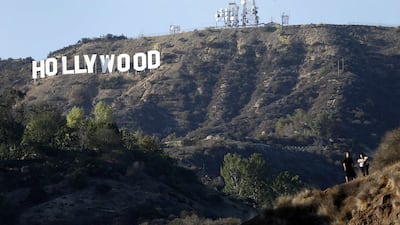Last Tuesday, around midnight in California, the entertainment industry ground to a halt. That was about the time that television networks and news organisations could confidently announce that Donald Trump – the brash, vulgar, possibly unhinged property and construction mogul – was going to be the next president of the United States.
Most of Hollywood was crushed, of course. Trump ran as a Republican – although in the past he has claimed membership in the Democratic Party – and the vast majority of show business power brokers campaigned against him. But that’s not what sent shock waves through the industry. After all, they watched George W Bush, another president they weren’t crazy about, get elected twice without feeling shaken to the core.
But what Trump’s victory represented to the entertainment industry was a systemic and catastrophic failure of the technology used to anticipate and measure the public’s true mood. For an unbroken string of 12 months, opinion polls and focus groups and voter interviews suggested that Trump’s opponent, Hillary Clinton, had a solid lead. The gap between the two widened and narrowed occasionally, but it was a safe bet on Tuesday morning, before the voting actually began, that it was going to be Hillary Clinton, not Donald Trump, giving a rousing acceptance speech that night. That was, after all, what the science of audience measurement was telling us.
And then disaster struck. The polls were wrong. The voter surveys were wrong. The focus groups were wrong. The entire apparatus used to predict what people want, and how they want it, was revealed to be almost entirely broken. Hillary Clinton wasn’t the only loser last week. Movie studios and television networks employ giant research departments who are supposed to know, using the same tools politicians do, which movies or television shows will be hits and which will not. All of those people lost, too.
Hollywood and the entertainment industry was set back decades. For a long time, Los Angeles was a dusty and ramshackle town. Boulevards ended abruptly into dirt roads, flimsy houses were built on precarious hillsides – until the mid-1950s, the town still felt like a cowboy town that had suddenly undergone a growth spurt.
Most of the San Fernando Valley – now home to sprawling bedroom communities and movie studios – was blanketed with citrus orchards.
“This used to be all orange groves,” old-timers would say, to anyone who might listen, when surveying the smoggy and traffic-clogged highways. “You could see snow on the mountains, and clear to the beach.”
Back then, here’s how a movie or television show would be set into production: a writer or director would have an idea, they’d sell that idea to a studio or network executive, and the project would get made. Or, a mogul or executive would have an idea, order some writer to turn out a fast screenplay, and as the pages came out of his typewriter they’d go straight to the soundstage and on to celluloid.
All of these steps might take, in total, a week or two from idea to script, and then another few weeks before the movie was in the cinema or the show was on television. Here’s how a movie or television show gets made today: someone has an idea, usually based on another idea someone else has already had. The idea is carefully compared to a list of settings and story types that have already been developed by the studio or network, in consultation with a market research firm employing pollsters, focus groups, and audience surveys. The idea is then produced, but before it gets to an audience it is subjected to a barrage of market research experiments, where alternative endings are tested, characters are subjected to focus group panels to measure their likeability, audiences are surveyed for storyline preferences, and the entire project is measured – using what were, until last Tuesday, universally trusted methods of marketing research and audience data gathering – for its potential for success.
When a project is in great shape, we in the entertainment industry say that it’s “testing well,” meaning the metrics of audience research are pointing in a positive direction. When it’s not, we say that a project “just didn’t test”, meaning it looked like a loser.
Shows and movies that test well get released into cinemas and onto television screens. Those that don’t get stopped in their tracks. Billions of dollars are at stake in these decisions.
It is fair to say that in entertainment industry parlance, up until that Tuesday morning, Mr Trump was not testing well. The numbers were not looking good, and the signs were not in his favour. And yet, it all turned out in an unexpected way. Voters, apparently, are a complicated and unfathomable thing. No amount of measuring and polling and surveying can ever allow us to know the future with any certainty.
And what’s true of voters must be true of audiences, as well, which is why Hollywood –with its multimillion-dollar superhero films and its television extravaganzas – is quaking in its boots. It’s not just that Donald Trump is going to be the president. It’s that no one knew it was coming.
Rob Long is a writer and producer in Los Angeles
On Twitter: @rcbl

